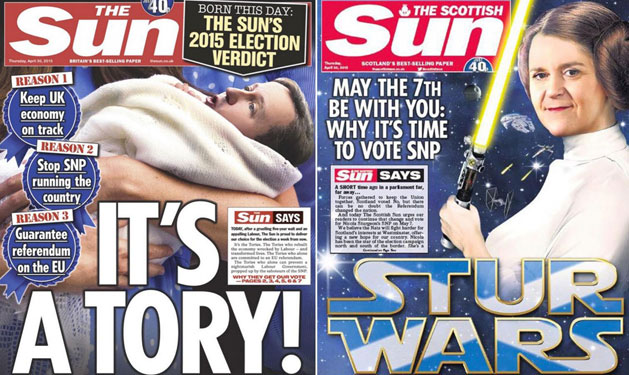Will The Sun's split verdict make any difference to the election?
The Sun has got two hats on, but expert says no newspaper can claim it 'won it' for any government

A free daily email with the biggest news stories of the day – and the best features from TheWeek.com
You are now subscribed
Your newsletter sign-up was successful
The Sun and its sister paper The Scottish Sun – the two biggest selling dailies south and north of the border – are backing opposing political parties for the general election.
The London-based Sun is urging readers to back the Conservatives, while the Scottish Sun praises SNP leader Nicola Sturgeon as a "phenomenon" who can offer "new hope" for Scotland.
"Certainly, when set side by side, there is something of an incongruity," says Niall Paterson, Scotland correspondent for Sky News. But he notes that the papers have separate editors and often have different approaches to the same stories to match their audience.
The Week
Escape your echo chamber. Get the facts behind the news, plus analysis from multiple perspectives.

Sign up for The Week's Free Newsletters
From our morning news briefing to a weekly Good News Newsletter, get the best of The Week delivered directly to your inbox.
From our morning news briefing to a weekly Good News Newsletter, get the best of The Week delivered directly to your inbox.
The real question is: will their verdicts make any difference to the election results?
The newspaper's notorious "It's The Sun Wot Won It" front-page after the 1992 election has gone down in newspaper folklore. However, the extent to which The Sun's campaign against Labour helped John Major into office is debatable.
The Guardian's media commentator Roy Greenslade says The Sun is often regarded as "the most valuable catch" by the main parties because it is read by the greatest number of people who have switched allegiance in the past.
With most elections decided by relatively small margins in the overall vote, it is "possible that a relatively small swing among Sun-reading voters can be crucial, though only, in my view, if they live in marginal seats", he says.
A free daily email with the biggest news stories of the day – and the best features from TheWeek.com
But Tom Felle, the acting director of interactive and newspaper journalism at City University London, says no newspaper could ever claim that that it was they "wot won it" for any government.
He says newspapers might set the agenda, but they are also an "echo chamber" for the broadly shared views of readers, reinforcing views their readers already hold.
"Newspaper readers tend to vote for parties that broadly represent their interests, in the same way they buy newspapers that broadly speak to their interests," he says. Meanwhile, the influence of papers has "dwindled significantly" as circulations decline in the digital era, says Felle.
In a recent survey by Ipsos Mori, under-35s listed social media as the second biggest influence on their vote after scheduled televised debates – although across all ages, social media came in fourth, below TV debates, newspapers and party election broadcasts.
No party will be willing to abandon newspapers altogether, says Felle, but it is "not surprising that all the political parties are investing heavily in social media campaigns in the run up to the May election".